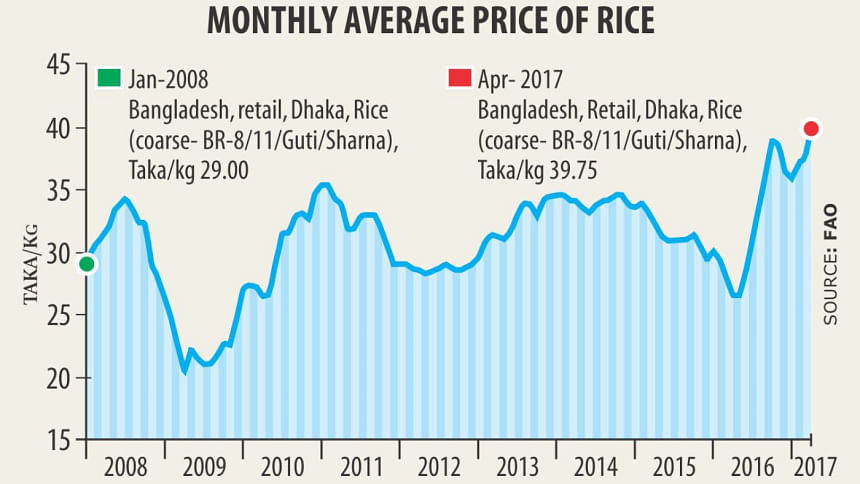Meals get pricier in a week

Rising prices of some essentials, including rice, sugar and vegetables, are hitting consumers hard, especially those in low and fixed income groups.
Most of the vegetables have seen their prices go up by Tk 5-15 a kilogram in city markets over the last 10 days, reducing the capacity of the poor to have dietary diversity in meals.
“Now I have to spend more to buy the same quantity of vegetables I bought at the end of last month. It's becoming difficult day by day to meet the basic needs of my family with my fixed income,” said Arjun Majumder, who works at a ticket counter of bus operator Ena Paribahan.
The 30-year-old transport worker earns only Tk 8,000 a month, which is far from enough to cover the expenses of his three-member family.
He has to spend an additional Tk 5-10 for a kg of vegetables and an extra Tk 4 for a kg of rice now than in the last month.
Fish have also become dearer, said Arjun who lives with his family in a rented house in the capital's Nakhalpara area.
Consumers living in other parts of the city also had similar experience. Most of them complained that very few vegetables were available below Tk 40 a kg.
The prices of essentials are going up at a time when inflation has been on the rise since December last year.
According to Bangladesh Bureau of Statistics, inflation rose to 5.31 percent in February from 5.15 percent in January this year. It was 5.03 percent in December last year.
The prices of coarse rice hit a nine-year high last month. In the capital, it was sold for Tk 39.75 a kg last month, up from Tk 37.5 a kg a month ago.
In January 2008, the price of coarse rice was Tk 29 a kg, shows data of the Food and Agriculture Organization.
The prices of garlic, sugar and chickpea have also shot up, according to Trading Corporation of Bangladesh.
Gul Mahfuza, a university student, was surprised at the prices of most of the vegetables at Hatirpool market in the capital.
“I bought a kg of bitter gourd for Tk 60 a week ago, but I had to buy it for Tk 80 today [Sunday].
“If the prices continue to rise before the Ramadan, I don't know what will happen during the holy month,” she said.

Wishing anonymity, a private college teacher said she bought okra and eggplant for Tk 60 a kg each at a bazar in Mirpur on Saturday whereas she had bought the same for less than Tk 50 a kg two weeks ago.
“The prices are too high for many.”
Asked whether she inquired the sellers about the reason behind the price hike, she said, “What's the point of asking them the reasons behind the price spiral?”
Traders in the city blamed supply shortage for the price hike. They said excessive rain and hailstorm damaged crops and vegetables in many parts of the country, leading to a drop in supply and the price spike.
Growers and traders in Savar and Bogra echoed their words.
Jahangir Alam, a vegetable grower in Savar, said heavy rain damaged bitter gourd and wax gourd on four-fifths of his one-acre cropland.
“The condition of crops doesn't look good,” he said.
Seeking anonymity, a senior official of the Department of Agricultural Marketing said many parts of the country saw excessive rain last month when summer vegetables just started coming to markets.
The blow to vegetable growers comes after flood hit haor areas and some northwestern parts of the country. Moreover, blast attack caused loss of paddy in several northwestern districts last month, leading to a further rise in prices of the staple.
Around a week ago, Prime Minister Sheikh Hasina warned of tough action against hoarding of food grains and increasing food prices artificially on the plea of sudden flood in the haor region.
"There is no shortage of food in the country," she said at a rally during her visit to Sunamganj.
Talking to this newspaper, some consumers demanded increased monitoring by the authorities for ensuring fair prices of the essentials in the markets.
Aklima Yeasmin, a housewife who went to the New Market to buy groceries, said heavy rain may have an impact on prices of rice and vegetables. “But I don't find any relations between it and rising prices of garlic, potato and onion.”
Mohammad Amir Ali, a garment worker at Ashulia, said he had to pay Tk 2,550 for a 50-kg sack of rice on May 4, up from Tk 2,120 a month ago.
He also paid more than the usual price for pointed gourd and eggplant.
“My wages have not gone up. It's hard to keep up with the soaring prices of rice and other essentials,” said the 26-year-old worker, who can earn a maximum of Tk 10,000 a month, including overtime.
“We have to work hard. But we cannot get the required amount of nutrition... The price spike has worsened the situation further... It hurts,” said Ali.
Mizanur Rahman, who runs a 22-member mess at Tejturi Bazar, said he had to spend Tk 3,500 daily for buying foods for the members, up from Tk 3,000 seven to 10 days ago.
[Our correspondents from Savar, Bogra and Rajshahi contributed to this report.]

 For all latest news, follow The Daily Star's Google News channel.
For all latest news, follow The Daily Star's Google News channel. 



Comments